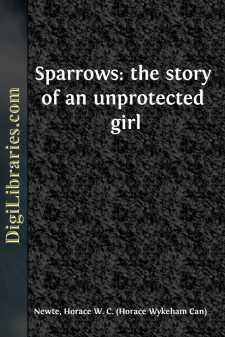Categories
- Antiques & Collectibles 13
- Architecture 36
- Art 48
- Bibles 22
- Biography & Autobiography 813
- Body, Mind & Spirit 142
- Business & Economics 28
- Children's Books 17
- Children's Fiction 14
- Computers 4
- Cooking 94
- Crafts & Hobbies 4
- Drama 346
- Education 46
- Family & Relationships 57
- Fiction 11829
- Games 19
- Gardening 17
- Health & Fitness 34
- History 1377
- House & Home 1
- Humor 147
- Juvenile Fiction 1873
- Juvenile Nonfiction 202
- Language Arts & Disciplines 88
- Law 16
- Literary Collections 686
- Literary Criticism 179
- Mathematics 13
- Medical 41
- Music 40
- Nature 179
- Non-Classifiable 1768
- Performing Arts 7
- Periodicals 1453
- Philosophy 64
- Photography 2
- Poetry 896
- Political Science 203
- Psychology 42
- Reference 154
- Religion 513
- Science 126
- Self-Help 84
- Social Science 81
- Sports & Recreation 34
- Study Aids 3
- Technology & Engineering 59
- Transportation 23
- Travel 463
- True Crime 29
Sparrows: the story of an unprotected girl
Description:
Excerpt
CHAPTER ONE
Everyone at Melkbridge knew the Devitts: they lived in the new, pretentious-looking house, standing on the right, a few minutes after one left the town by the Bathminster road. It was a blustering, stare-one-in-the-face kind of house, which defied one to question the financial stability of its occupants. The Devitts were like their home in being new, ostentatious folk; their prosperity did not extend further back than the father of Montague, the present head of the family.
Montague Devitt did little beyond attending board meetings of the varied industries which his father's energy had called into being. He was a bluff, well-set-up man, who had married twice; both of his wives had brought him money. Each time Montague chose a mate, he had made some effort to follow the leanings of his heart; but money not lying in the same direction as love, an overmastering instinct of his blood had prevailed against his sentimental inclinations; in each case it had insisted on his marrying, in one instance an interest in iron works, in another, a third share of a Portland cement business.
His first wife had borne him two sons and a daughter; his second was childless.
Montague was a member of two or three Bohemian clubs in London, to which, as time went on, he became increasingly attached. At these, he passed as a good fellow, chiefly from a propensity to stand drinks to any and everyone upon any pretence; he was also renowned amongst his boon companions for his rendering of "The Village Blacksmith" in dumb show, a performance greeted by his thirsty audience with thunders of applause.
Harold, his first born, will be considered later.
Lowther, his second son, can be dismissed in a few words. He was a good-looking specimen of the British bounder. His ideas of life were obtained from the "Winning Post," and the morality (or want of it) suggested by musical comedy productions at the Gaiety Theatre. He thought coarsely of women. While spending money freely in the society of ladies he met at the Empire promenade, or in the Cafe d' l'Europe, he practised mean economics in private.
Victoria, Montague's daughter, was a bit of a puzzle to friends and relations alike, all of whom commenced by liking her, a sentiment which, sooner or later, gave place to a feeling of dissatisfaction. She was a disappointment to her father, although he would never admit it to himself; indeed, if he had tried to explain this displeasure, he would have been hard put to it to give a straightforward cause for a distressing effect. On first acquaintance, it would seem as if she were as desirable a daughter as heart of father could want. She was tall, good-looking, well educated; she had abundance of tact, accomplishments, and refinement; she had never given her parents a moment of anxiety. What, then, was wrong with her from her father's point of view? He was well into middle age; increasing years made him yearn for the love of which his life had been starved; this craving would have been appeased by love for his daughter, but the truth was that he was repelled by the girl's perfection....


